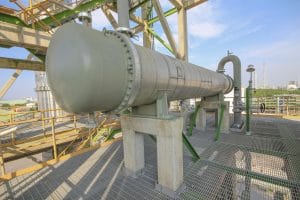 For the last several decades, heat exchangers have made most modern equipment and technology more capable than ever before. The innovative thermal management solutions dramatically streamline the processes of cooling electrical control panels and other enclosures. This has had significant benefits in helping companies control overall costs and energy consumption. Because of their advantages, companies have been able to optimize the use of advanced technology to improve their operational capabilities far beyond what they expected. (more…)
For the last several decades, heat exchangers have made most modern equipment and technology more capable than ever before. The innovative thermal management solutions dramatically streamline the processes of cooling electrical control panels and other enclosures. This has had significant benefits in helping companies control overall costs and energy consumption. Because of their advantages, companies have been able to optimize the use of advanced technology to improve their operational capabilities far beyond what they expected. (more…)
Making Thermal Management Easier in Hazardous Locations
 There are some electrical thermal management considerations that are common across virtually all applications. Then, there are those applications that are designed for extreme high-performance tasks, or that operate under severe conditions, and therefore, require higher-than-normal performance and safety from their thermal management solutions. For such applications, conventional heat exchangers may not always be viable solutions. However, iterations of the technology are now available that are made specifically to endure harsh conditions in hazardous locations, and are able to provide optimal efficiency and safety despite those conditions. (more…)
There are some electrical thermal management considerations that are common across virtually all applications. Then, there are those applications that are designed for extreme high-performance tasks, or that operate under severe conditions, and therefore, require higher-than-normal performance and safety from their thermal management solutions. For such applications, conventional heat exchangers may not always be viable solutions. However, iterations of the technology are now available that are made specifically to endure harsh conditions in hazardous locations, and are able to provide optimal efficiency and safety despite those conditions. (more…)
How Modern Farms Benefit from Heat Exchanger Technology
 Of the many different industries that have benefited from modern heat exchanger technology, agriculture and farming are among the most important. Not only do companies benefit, but also the consumers that rely on the industry for their dietary needs. Thanks to the innovative thermal management and eco-friendly processes made possible by heat exchangers, farms have become increasingly safer and more efficient in several different key areas. (more…)
Of the many different industries that have benefited from modern heat exchanger technology, agriculture and farming are among the most important. Not only do companies benefit, but also the consumers that rely on the industry for their dietary needs. Thanks to the innovative thermal management and eco-friendly processes made possible by heat exchangers, farms have become increasingly safer and more efficient in several different key areas. (more…)
Benefiting from Liquid Cooling with Heat Exchangers
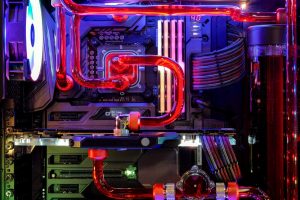 Liquid cooling has proven one of the most effective and efficient methods of managing large amounts of waste heat. The use of cooling fluids to transfer heat and dissipate it rapidly means applications aren’t limited in their operations due to inefficient and/or overly expensive thermal management processes (like air conditioning). However, utilizing liquid cooling hasn’t always been achievable for many types of applications. Doing so was costly, and companies that didn’t have resources to burn couldn’t always afford it. Now, heat exchangers have made liquid cooling and its many significant benefits attainable for a much wider variety of applications, and at a much lower cost than many companies still expect. (more…)
Liquid cooling has proven one of the most effective and efficient methods of managing large amounts of waste heat. The use of cooling fluids to transfer heat and dissipate it rapidly means applications aren’t limited in their operations due to inefficient and/or overly expensive thermal management processes (like air conditioning). However, utilizing liquid cooling hasn’t always been achievable for many types of applications. Doing so was costly, and companies that didn’t have resources to burn couldn’t always afford it. Now, heat exchangers have made liquid cooling and its many significant benefits attainable for a much wider variety of applications, and at a much lower cost than many companies still expect. (more…)
Can Heat Exchangers Really Boost Green Energy Efforts?
 When it comes to energy, heat exchangers have always stood out. They first became popular as more energy-efficient alternatives to air conditioners for providing consistent electrical thermal management. However, the more advanced technology uses them, the broader those benefits have become. For example, as the push for greener and more eco-friendly solutions has grown stronger, the advantages of having an energy and cost-effective electrical thermal management solution have become even more important. As more companies implement heat exchangers to meet their thermal management needs, more industries have also benefited from their green energy characteristics. (more…)
When it comes to energy, heat exchangers have always stood out. They first became popular as more energy-efficient alternatives to air conditioners for providing consistent electrical thermal management. However, the more advanced technology uses them, the broader those benefits have become. For example, as the push for greener and more eco-friendly solutions has grown stronger, the advantages of having an energy and cost-effective electrical thermal management solution have become even more important. As more companies implement heat exchangers to meet their thermal management needs, more industries have also benefited from their green energy characteristics. (more…)
A Brief Look at Modern Heat Transfer Concepts
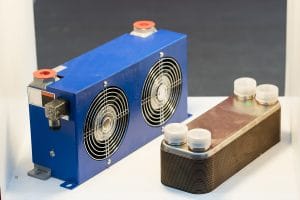 For companies that utilize heat exchangers for their electrical thermal management needs, the benefits of having a more conservative and cost-effective option than air conditioners and air compressors has been of significant value. Compared to these traditional solutions, heat exchangers provide constant electrical cooling at much lower costs, with much more consistent results, and at rates that often exceed more traditional solutions. That’s largey due to their innovative heat transfer concepts that make managing waste heat much simpler and more efficient. (more…)
For companies that utilize heat exchangers for their electrical thermal management needs, the benefits of having a more conservative and cost-effective option than air conditioners and air compressors has been of significant value. Compared to these traditional solutions, heat exchangers provide constant electrical cooling at much lower costs, with much more consistent results, and at rates that often exceed more traditional solutions. That’s largey due to their innovative heat transfer concepts that make managing waste heat much simpler and more efficient. (more…)
Food & Beverage Production with the Help of Heat Exchangers
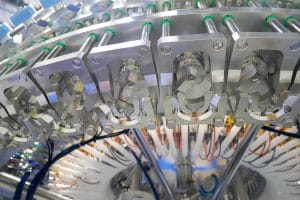 In the realm of food and beverage production, thermal management concerns span a wider range than in many other industries. For instance, the electrical thermal management needed to keep technology and equipment properly cooled is similar to the needs of nearly every other industry. However, other processes specific to food and beverage production also rely heavily on effective thermal management, and with advanced heat exchangers, companies can streamline those processes, as well. (more…)
In the realm of food and beverage production, thermal management concerns span a wider range than in many other industries. For instance, the electrical thermal management needed to keep technology and equipment properly cooled is similar to the needs of nearly every other industry. However, other processes specific to food and beverage production also rely heavily on effective thermal management, and with advanced heat exchangers, companies can streamline those processes, as well. (more…)
Using Heat Exchangers to Optimize Power Usage
 Given the nature of most of today’s advanced technology, optimizing power usage has become more than just a luxury – it’s a necessity. For many applications, electrical thermal management is often one of the most significant areas where power consumption is highest. Therefore, the advent of heat exchangers to streamline thermal management has provided profound benefits for technologies of all types. With the ability to transfer waste heat rapidly and at high volumes, heat exchangers help keep electrical enclosures, control panels, and more properly cooled while consuming minimal amounts of energy. (more…)
Given the nature of most of today’s advanced technology, optimizing power usage has become more than just a luxury – it’s a necessity. For many applications, electrical thermal management is often one of the most significant areas where power consumption is highest. Therefore, the advent of heat exchangers to streamline thermal management has provided profound benefits for technologies of all types. With the ability to transfer waste heat rapidly and at high volumes, heat exchangers help keep electrical enclosures, control panels, and more properly cooled while consuming minimal amounts of energy. (more…)
Where to Transfer Electrical Waste Heat for Higher Efficiency
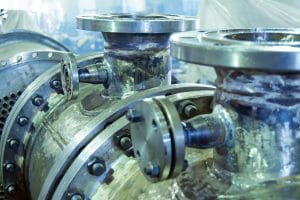 The goal of electrical thermal management has always been to effectively prevent waste heat from accumulating into pockets, which could lead to serious system damage. Traditionally, this has been accomplished through various ways, such as circulating chilled or compressed air through electrical enclosures. However, heat exchangers take a different approach by transferring the heat instead of eliminating it. The processes for doing so (i.e., convection, natural/forced convection, and phase-change cooling) require much less energy and effort than using chilled air to keep enclosures cool. They also allow for the repurposing of the waste heat, which means companies can save more costs and streamline operations even further. (more…)
The goal of electrical thermal management has always been to effectively prevent waste heat from accumulating into pockets, which could lead to serious system damage. Traditionally, this has been accomplished through various ways, such as circulating chilled or compressed air through electrical enclosures. However, heat exchangers take a different approach by transferring the heat instead of eliminating it. The processes for doing so (i.e., convection, natural/forced convection, and phase-change cooling) require much less energy and effort than using chilled air to keep enclosures cool. They also allow for the repurposing of the waste heat, which means companies can save more costs and streamline operations even further. (more…)
What to Remember About Cooling Electrical Enclosures
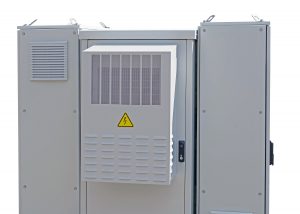 In most applications, the threat of overheating equipment is a significant concern. Most forms of technology generate waste heat somehow, and in large-scale applications, controlling that heat is vital to maintaining operations. For example, if an electrical enclosure isn’t properly cooled, then the damage that excess waste heat can cause to the components inside of it could spell disaster for all of the systems that are attached to it. Fortunately, cooling electrical enclosures has become a much simpler and more streamlined process thanks to the benefits of advanced heat exchangers. (more…)
In most applications, the threat of overheating equipment is a significant concern. Most forms of technology generate waste heat somehow, and in large-scale applications, controlling that heat is vital to maintaining operations. For example, if an electrical enclosure isn’t properly cooled, then the damage that excess waste heat can cause to the components inside of it could spell disaster for all of the systems that are attached to it. Fortunately, cooling electrical enclosures has become a much simpler and more streamlined process thanks to the benefits of advanced heat exchangers. (more…)







